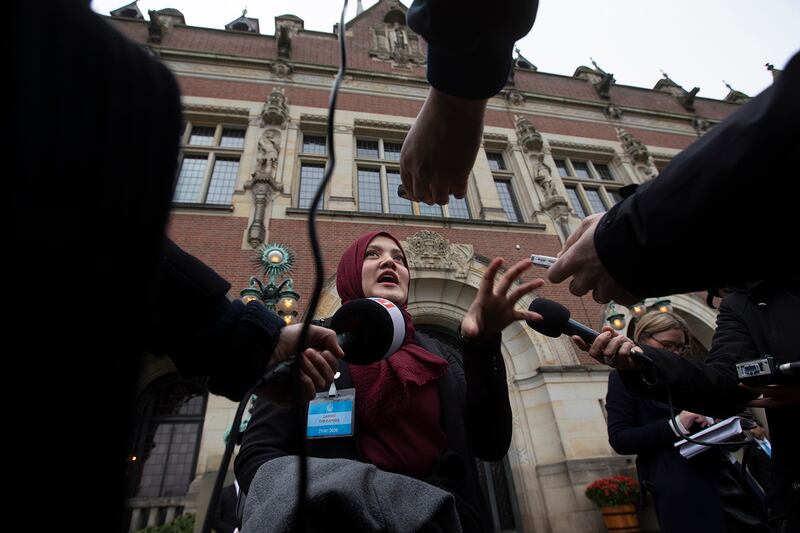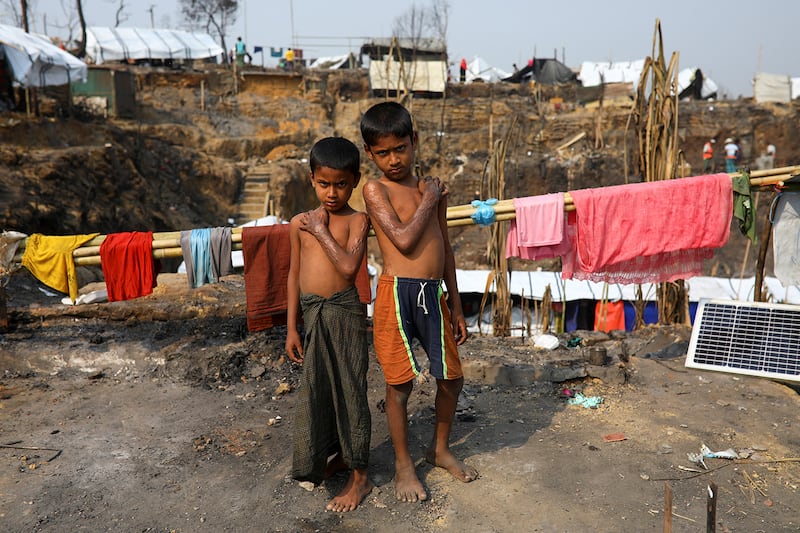Rohingya Muslim activists representing fellow refugees forced out of Myanmar and into " prison-like" camps in Bangladesh said in Washington on Thursday that foreign aid to the camps would go further if some of it was given directly to refugee-run groups.
But a representative of the U.S. Agency for International Development, or USAID, said little money was left over after aid cuts that currently see the refugees provided with only $10 worth of food a month.
About 90% of the 1.2 million Rohingya refugees in Bangladesh struggled to have "acceptable food consumption" late last year, according to the World Food Programme, when their monthly ration of food was bumped up from about $8 to about $10 per person.
Speaking at an event on Capitol Hill to mark two years since the United States labelled Myanmar's atrocities in 2017 against the Rohingya a " genocide," the activists said aid was not always spent in ways most helpful for the Rohingya refugees living in Cox's Bazar.
"There are ways to do it effectively," said Yasmin Ullah, a Canada-based rights activist born in Myanmar's Rakhine state and the director of the Rohingya Maiyafuinor Collaborative Network.

The activist said her group had raised $20,000 through crowdfunding to be disbursed by refugee-run groups in the camp to improve livelihoods there. But she noted global aid flows were far larger.
“We know our issues. We know how and where to put this money. We can run with $10,000 farther than any other humanitarian groups can,” she said. “We are asking for aid to be utilized and to directly go to refugee-led initiatives and refugee-led organizations.”
Unsolved problems
Aid for Rohingya refugees in Bangladesh has dwindled, with less than two-thirds of the approximately $850 million in annual aid requested by aid agencies in the country being fulfilled, according to a U.N. report.
Lucky Karim, a Rohingya refugee who resettled in the U.S. state of Illinois in 2022 and now works with the International Campaign for the Rohingya, said that any international aid sent to help people in the camps “means a lot to us as refugees” and was appreciated.
But she questioned why the hundreds of millions of dollars flowing into the camps each year were not improving conditions.
“It’s not about how many years the U.S. has been supporting Rohingya,” Karim said. “What are you guys able to solve?”
“Did you solve the labor issue? Did you solve the sexual and domestic and the other violence in the camps? Did you solve the human trafficking issue? Did you figure out the security risks at the camp? Did you figure out and identify the gangs and the nonstate actors in the camp at night?” she said. “Those are the only questions we have.”
Requests for more help, she added, were “not just about increasing funding,” with many Rohingyas understanding funds are limited.
“When it comes to the funding issue, when I talked to USAID, for example, they're like, ‘Oh no Lucky, we have other places in war, like Gaza, for example, and Ukraine, for example,’” Karim recounted, noting there were “many other cases coming up every few years.”
Like Ullah, she said some aid could be spent more effectively.
“The amount of funding you're sending to Rohingya refugees in Cox's Bazar and elsewhere should go to the right people at the right time to the needed situations,” she said. “How do you ensure it without Rohingya’s involvement in the decision making process?”
Limited funds
Peter Young, the USAID director for South and Central Asia, told the event that the United States had sent more than $1.9 billion in aid to support Rohingya refugees in Bangladesh since the 2017 genocide.
But he acknowledged the global aid being made available “is not sufficient to meet the needs of people” in the refugee camps. What was once a $12 monthly food ration to the refugees, he explained, was cut to just $8 last year before the eventual bump back to $10.

At the end of the day, he said, aid groups were left grappling with the fact they have few funds left after disbursing those meager rations.
“We certainly agree with – as Lucky said – the importance of working with and through the Rohingya community,” Young said. “We do make sure our projects that are implemented there are staffed by Rohingya there [or] developed in consultation with community leaders.”
“At the same time, if you do the math, $10 a month for a million people consumes our entire budget pretty quickly,” he said. “So the bandwidth that we have to do other programming besides food is limited.”
One of the first priorities for the refugee camps outside of food would be "durable shelters," Young said, due to both the propensity of the camps to be hit by devastating disasters and the "understanding that there will be a lot of people there for some time into the future."
But for the Rohingya activists, that’s only a start.
Karim, the Illinois-based refugee, said little will change in the camps until Rohingyas are given some decision-making powers – and “not just coming to D.C. every six months” for forums on Capitol Hill.
“You take a bunch of notes, you leave us, you forget us,” the activist said. “We want a specific seat at the table.”
